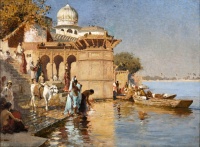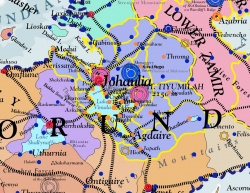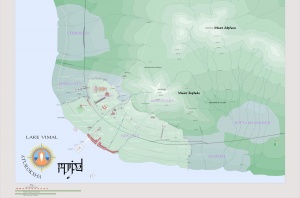Difference between revisions of "Addinoro"
Trismegistus (talk | contribs) |
Trismegistus (talk | contribs) m |
||
| (8 intermediate revisions by the same user not shown) | |||
| Line 1: | Line 1: | ||
| − | A principal and ancient city of [[Vimalia]] in on the shore of [[Lake Vimala]], Addinoro is a subject city of the [[Republic of Johaulia]] and celebrated for its ancient priesthood, temples, and history. Addinoro is also the seat of a municipality in its own right. In [[Jathya-Dhumi Language|Jathya-Dhumi]], Addinoro is called [[Aturoksha]] which means "City of the god Atur". The city's namesake is thought to be the most ancient or nearly most ancient cult since it was established. Lord [[Atur]] and Lord [[Vimal]] are the two principal divinities that have been propitiated for countless millennia. Addinoro is attested in legend at least to the seventh millennium before [[Salmakhamer]]. Addinoro (Aturoksha) was the capital of the Kalaman Empire during the five dynasties of the [[Surizhah Kingdom]], from 3042 [[AS]] to 2323 [[AS]] (about 719 years) and the five dynasties of the [[Tamukh Kingdom]], from 2323 [[AS]] to 1884 [[AS]] (about 439 yrs). The so-called zombie plagues (2,400 AS to 2,100 AS) which arose periodically as part of the great wars between the [[Neptultchi]] empire and the Kalaman Kingdom precipitated the collapse of the Surizhah Kingdom. When the Tamukh Kingdom collapsed, Aturoksha became an independent city under the direct rule of the high priest of the Temple of Atur, during the [[ | + | A principal and ancient city of [[Vimalia]] in on the shore of [[Lake Vimala]], Addinoro is a subject city of the [[Republic of Johaulia]] and celebrated for its ancient priesthood, temples, and history. Addinoro is also the seat of a municipality in its own right. In [[Jathya-Dhumi Language|Jathya-Dhumi]], Addinoro is called [[Aturoksha]] which means "City of the god Atur". The city's namesake is thought to be the most ancient or nearly most ancient cult since it was established. Lord [[Atur]] and Lord [[Vimal]] are the two principal divinities that have been propitiated for countless millennia. Addinoro is attested in legend at least to the seventh millennium before [[Salmakhamer]]. Addinoro (Aturoksha) was the capital of the Kalaman Empire during the five dynasties of the [[Surizhah Kingdom]], from 3042 [[AS]] to 2323 [[AS]] (about 719 years) and the five dynasties of the [[Tamukh Kingdom]], from 2323 [[AS]] to 1884 [[AS]] (about 439 yrs). The so-called zombie plagues (2,400 AS to 2,100 AS) which arose periodically as part of the great wars between the [[Neptultchi]] empire and the Kalaman Kingdom precipitated the collapse of the Surizhah Kingdom. When the Tamukh Kingdom collapsed, Aturoksha became an independent city under the direct rule of the high priest of the Temple of Atur, during the [[Kalaman Interregnal Period|Interregnal Period]], 1884 AS to 1729 AS (about 155 yrs). The city was renamed Addinoro during the Midretassene Period when according to legend, the demi-god, [[Addan]] slew the water dragons in Lake Vimala. The name today, Addinoro, ironically, is only used by foreigners as the locals use the ancient name. Despite this, there are several shrines to the Jathya-Dhumi version of the demi-god, Addan, in the city. In the most ancient legends, the titan [[Zayomundo]] founded the city in antediluvian times that once stood on the ground where Addinoro now stands. |
[[File:MapJohauliaRepublicMunicipalities2745.jpg|thumb|250px|Situation of Addinoro in roughly the center of the Republic of Johaulia]] | [[File:MapJohauliaRepublicMunicipalities2745.jpg|thumb|250px|Situation of Addinoro in roughly the center of the Republic of Johaulia]] | ||
| Line 15: | Line 15: | ||
=Government= | =Government= | ||
Aturoksha is a principal city, third in precedence in the [[Republic of Johaulia]], and chief city of its local jurisdiction. | Aturoksha is a principal city, third in precedence in the [[Republic of Johaulia]], and chief city of its local jurisdiction. | ||
| + | |||
| + | [[File:AturokshaCityMapReduced.jpg|thumb|300px|Aturoksha and environs, ca 2730]] | ||
=Sites= | =Sites= | ||
*[[Ancient Philosophical College of Aturoksha]] | *[[Ancient Philosophical College of Aturoksha]] | ||
*[[Aturokshan School of the Beautiful Arts]] | *[[Aturokshan School of the Beautiful Arts]] | ||
| − | *[[Great Temple of Atur]] | + | *[[Sacerdotal College of Aturoksha]], near temple of Atur |
| + | *[[Great Temple of Atur]] ([[Temple of Atur of the Great Flood]]) | ||
*[[Zicchaluksho Palace]] (Residence of the High Priest of Atur) | *[[Zicchaluksho Palace]] (Residence of the High Priest of Atur) | ||
*[[Temple of Lord Vimal of the Pilgrims]] | *[[Temple of Lord Vimal of the Pilgrims]] | ||
| Line 123: | Line 126: | ||
=Notable Addinorans= | =Notable Addinorans= | ||
*[[Ankhura-Sin]] Senior chaos priest of the [[Kaiwakkha Shaluspahi]], lived 6,249 AS to 6,152 AS (~97 years), ruler of [[Aturoksha]] in very ancient [[Kalama]] | *[[Ankhura-Sin]] Senior chaos priest of the [[Kaiwakkha Shaluspahi]], lived 6,249 AS to 6,152 AS (~97 years), ruler of [[Aturoksha]] in very ancient [[Kalama]] | ||
| − | *[[Manshuyanda the Spell-strong of Aturoksha]], powerful wizard who established a school of wizardry in the [[Tamukh Dynasty]], 2323 | + | *[[Manshuyanda the Spell-strong of Aturoksha]], powerful wizard who established a school of wizardry in the [[Tamukh Dynasty]], 2323 [[AS]] to 2210 [[AS]] |
*[[Orkybanthinantis of Addinoro]], b 583, Addinoro, [[Vimalia]]; d 646, [[Johaulia]], [[Vimalia]]. Antiquarian, historian, author of the famous [[Kalamantica]] | *[[Orkybanthinantis of Addinoro]], b 583, Addinoro, [[Vimalia]]; d 646, [[Johaulia]], [[Vimalia]]. Antiquarian, historian, author of the famous [[Kalamantica]] | ||
*[[Zayomundo]] a mythical, antediluvian titan said to have founded Aturoksha or the fortress that preceded it | *[[Zayomundo]] a mythical, antediluvian titan said to have founded Aturoksha or the fortress that preceded it | ||
| Line 131: | Line 134: | ||
*Mythical Founding and Settlement, founded by the titan [[Zayomundo]], before the [[Flood of Aturyanda]], unknown date, | *Mythical Founding and Settlement, founded by the titan [[Zayomundo]], before the [[Flood of Aturyanda]], unknown date, | ||
*Destroyed by earthquakes attendant with the [[Flood of Aturyanda]] | *Destroyed by earthquakes attendant with the [[Flood of Aturyanda]] | ||
| − | *Hanumbasha Dynasty | + | *[[Hanumbasha Dynasty]] |
| − | *Surizhah Kingdom | + | *[[Surizhah Kingdom]] |
*[[Tamukh Kingdom]], to 1884 AS | *[[Tamukh Kingdom]], to 1884 AS | ||
| − | *1884 to 1729 AS: | + | *1884 to 1729 AS: [[Kalaman Interregnal Period]] |
*1729 to 1117 AS; [[Jatha-Nebir Kingdom]] | *1729 to 1117 AS; [[Jatha-Nebir Kingdom]] | ||
*1729 to 1597: ? | *1729 to 1597: ? | ||
| − | *1597, Aturoksha becomes subject to Ummattha Dynasty | + | *1597, Aturoksha becomes subject to [[Ummattha Dynasty]] |
| − | *1597 to 1578 AS, Ummattha Dynasty, ~54 yrs, (Jatha-Nebir Kingdom) | + | *1597 to 1578 AS, Ummattha Dynasty, ~54 yrs, ([[Jatha-Nebir Kingdom]]) |
| − | *Succeeding 5 dynasties of Jatha-Nebir Kingdom | + | *Succeeding 5 dynasties of [[Jatha-Nebir Kingdom]] |
*453 Priest-King of Aturoksha made subject to King of the Midrinksi | *453 Priest-King of Aturoksha made subject to King of the Midrinksi | ||
*366 Fall of Aturoksha. King of the Midrinksi establishes a royal governor. | *366 Fall of Aturoksha. King of the Midrinksi establishes a royal governor. | ||
| + | ;Midretassene Empire | ||
| + | |||
| + | ;Yophenthean Empire | ||
| + | |||
| + | ;Yophenthean Successor Ruler | ||
| + | |||
| + | ;Early Middle Ages | ||
==Temple of Ten Thousand Passions== | ==Temple of Ten Thousand Passions== | ||
| − | Dedicated to the gods of Chaos, especially [[Lygdamion]], the Temple of Ten Thousand Passions was built during the Middle Ages of Chaos near the historic Temple of Atur. The Temple of Ten Thousand Passions was subsequently damaged by earthquake or subsidence. After the [[Isbajath of the Penitents]], 2265 to 2267, the Temple of Ten Thousand Passions was razed and the site made into open pavement in the temple district to remove the memory of its | + | Dedicated to the gods of Chaos, especially [[Lygdamion]], the Temple of Ten Thousand Passions was built during the Middle Ages of Chaos near the historic Temple of Atur. The Temple of Ten Thousand Passions was subsequently damaged by earthquake or subsidence. After the [[Isbajath of the Penitents]], 2265 to 2267, the Temple of Ten Thousand Passions was razed and the site made into open pavement in the temple district to remove the memory of its obscenities. |
=See Also= | =See Also= | ||
| Line 158: | Line 168: | ||
[[Category:Cities of Asdar]] | [[Category:Cities of Asdar]] | ||
[[Category:Cities of Johaulia]] | [[Category:Cities of Johaulia]] | ||
| + | [[Category:Cities of Vimalia]] | ||
[[Category:Cities of Corundy]] | [[Category:Cities of Corundy]] | ||
{{stub}} | {{stub}} | ||
Latest revision as of 17:06, 21 October 2024
A principal and ancient city of Vimalia in on the shore of Lake Vimala, Addinoro is a subject city of the Republic of Johaulia and celebrated for its ancient priesthood, temples, and history. Addinoro is also the seat of a municipality in its own right. In Jathya-Dhumi, Addinoro is called Aturoksha which means "City of the god Atur". The city's namesake is thought to be the most ancient or nearly most ancient cult since it was established. Lord Atur and Lord Vimal are the two principal divinities that have been propitiated for countless millennia. Addinoro is attested in legend at least to the seventh millennium before Salmakhamer. Addinoro (Aturoksha) was the capital of the Kalaman Empire during the five dynasties of the Surizhah Kingdom, from 3042 AS to 2323 AS (about 719 years) and the five dynasties of the Tamukh Kingdom, from 2323 AS to 1884 AS (about 439 yrs). The so-called zombie plagues (2,400 AS to 2,100 AS) which arose periodically as part of the great wars between the Neptultchi empire and the Kalaman Kingdom precipitated the collapse of the Surizhah Kingdom. When the Tamukh Kingdom collapsed, Aturoksha became an independent city under the direct rule of the high priest of the Temple of Atur, during the Interregnal Period, 1884 AS to 1729 AS (about 155 yrs). The city was renamed Addinoro during the Midretassene Period when according to legend, the demi-god, Addan slew the water dragons in Lake Vimala. The name today, Addinoro, ironically, is only used by foreigners as the locals use the ancient name. Despite this, there are several shrines to the Jathya-Dhumi version of the demi-god, Addan, in the city. In the most ancient legends, the titan Zayomundo founded the city in antediluvian times that once stood on the ground where Addinoro now stands.
Climate
Resting on the southwesternmost end of the Takshuhona Peninsula, Addinoro enjoys a very wet, temperate climate which is sometimes called a 'Mediterranean Rainforest.' The god Atur is aptly patron of the city as it receives an abundance of rain in spring and late summer, with endless drizzles during the winter. Addinoro is among the rainiest cities of Vimalia and has a climate best described as a 'Mediterranean Rain Forest' in Earth terms. The rainy weather is attributed to the fact that Atur rests next to a large lake on the plateau of Corundy. It also receives much rainfall run-off from the northeast Damisatta Mountains as the city is perched on steep slopes on the shore of Lake Vimala. A system of small canal channels were built in ancient times to help drain the city of its nearly perpetual rainfall. Even when it is not raining over the city, water drains almost continually during the wet seasons from the Damisatta Mountains.
Dragonrail
The dragonrail lines of Addinoro were built over the small canal channels that serve to drain the city during the rainy season as the city is too densely packed with buildings and many narrow streets.

Government
Aturoksha is a principal city, third in precedence in the Republic of Johaulia, and chief city of its local jurisdiction.
Sites
- Ancient Philosophical College of Aturoksha
- Aturokshan School of the Beautiful Arts
- Sacerdotal College of Aturoksha, near temple of Atur
- Great Temple of Atur (Temple of Atur of the Great Flood)
- Zicchaluksho Palace (Residence of the High Priest of Atur)
- Temple of Lord Vimal of the Pilgrims
- Old Magisterial Palace
- Steps of the Acolytes
- Porch of the Supplicants
- Court of the Oathbinders
- Temple of Addan the Vanquisher
- Saint Midretta's Chapel-Shrine
- Magistrates Port
- Palace of Municipality of Aturoksha
- Market of Sister Lankti
- Mushroommongers Market
- Flower sellers Market
- Fishermen's Docks
- Incensemonger Market
- Palace of Thagdala
- Zaliptuk Museum of Fine Art and Antiquities
Three Major "City" Districts of Addinoro
- Naivishomi, "Old City"
- New City of Aturoksha
- Sanctuary
DISTRICTS
- A
- Aracusian District
- Astrologers' District
- Ajantipshuda Art District
- B
- Beshbumni District (upper class)
- C
- Chaphendela District (Mid to Low Rent)
- D
- Drabundee Art District
- F
- Fathersayers District
- G
- Gaddho District (old Gorcorumbese District)
- H
- Haraphera Lenders District
- High Temple District
- J
Jecubian District
- K
- Kawchi-Mongers District
- Kojakut District (upper middle class)
- L
- Lake Captains District
- Lake Guard District (military lake ships)
- Lakeshore Temple District
- M
Musicians District
- N
- Najamera Lodging District
- O
- Old Ambassaders' District
- Ophiludi Sansha District (Courtesans' District)
- P
- Paimbalists District
- R
- S
- Salundee District (Nouveau Riche)
- Sirila Artisans' District
- Silkweavers District
- Storytellers District
- T
- Titancrafters District
- Tassan District
- Zamiri Market (at the foot of the Steps of the Supplicants)
- Thuvaki District
- U
- Uskabha Slums
- W
- Winemongers District
- Wizards District
Streets and Courts
Puka 'pook' means a narrow, windy, precipitous street
- Court of the Diviners
- Diviners Street
- Kawchimongers Street
- Lamp-Makers Street (famous metal-workers)
- Pantomime Street
- Street of the Glassblowers
- Street of the Goldworkers
- Street of the Tisbajuma
- Street of the Turtles
Neighboring Towns and Villages
Maps of Addinoro
Notable Addinorans
- Ankhura-Sin Senior chaos priest of the Kaiwakkha Shaluspahi, lived 6,249 AS to 6,152 AS (~97 years), ruler of Aturoksha in very ancient Kalama
- Manshuyanda the Spell-strong of Aturoksha, powerful wizard who established a school of wizardry in the Tamukh Dynasty, 2323 AS to 2210 AS
- Orkybanthinantis of Addinoro, b 583, Addinoro, Vimalia; d 646, Johaulia, Vimalia. Antiquarian, historian, author of the famous Kalamantica
- Zayomundo a mythical, antediluvian titan said to have founded Aturoksha or the fortress that preceded it
Historic Addinoro
- Mythical Founding and Settlement, founded by the titan Zayomundo, before the Flood of Aturyanda, unknown date,
- Destroyed by earthquakes attendant with the Flood of Aturyanda
- Hanumbasha Dynasty
- Surizhah Kingdom
- Tamukh Kingdom, to 1884 AS
- 1884 to 1729 AS: Kalaman Interregnal Period
- 1729 to 1117 AS; Jatha-Nebir Kingdom
- 1729 to 1597: ?
- 1597, Aturoksha becomes subject to Ummattha Dynasty
- 1597 to 1578 AS, Ummattha Dynasty, ~54 yrs, (Jatha-Nebir Kingdom)
- Succeeding 5 dynasties of Jatha-Nebir Kingdom
- 453 Priest-King of Aturoksha made subject to King of the Midrinksi
- 366 Fall of Aturoksha. King of the Midrinksi establishes a royal governor.
- Midretassene Empire
- Yophenthean Empire
- Yophenthean Successor Ruler
- Early Middle Ages
Temple of Ten Thousand Passions
Dedicated to the gods of Chaos, especially Lygdamion, the Temple of Ten Thousand Passions was built during the Middle Ages of Chaos near the historic Temple of Atur. The Temple of Ten Thousand Passions was subsequently damaged by earthquake or subsidence. After the Isbajath of the Penitents, 2265 to 2267, the Temple of Ten Thousand Passions was razed and the site made into open pavement in the temple district to remove the memory of its obscenities.
See Also
- Atur
- Corundy
- Kalama
- Lake Vimala
- Orkybanthinantis of Addinoro
- Republic of Johaulia
- Takshuhona Peninsula
| This article is a stub. It requires further development by the creator. |


